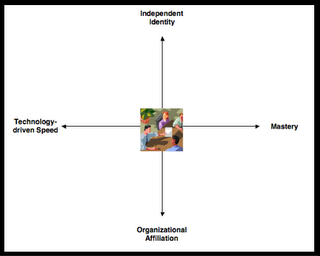Reports from the Knowledge Labs about our recent findings, research topics, and interviews with lifestyle leaders who are creating their own futures.
|
|
| |
How to stimulate your own powers of foresight. Consider the following thought provokers. Ask yourself, in these categories what are the brand new trends and forces? Which are the ones growing in importance? Which current forces are loosing their steam? Which have peaked or are reversing themselves? Which are the "wildcards" about to disrupt us in the future? POLITICAL AND TECHNICAL thought for food: Electronics, Materials, Energy, Fossil, Nuclear, Alternative, Other, Manufacturing (techniques), Agriculture, Machinery and Equipment, Distribution, Transportation (Urban, Mass, Personal, Surface, Sea, Subsurface, Space), Communication (Printed, Spoken, Interactive, Media), Computers (Information, Knowledge, Storage & Retrieval, Design, Network Resources), Post-Cold War, Third World, Conflict (Local, Regional, Global), Arms Limitation, Undeclared Wars, Terrorism, Nuclear Proliferation, Weapons of Mass Destruction, Governments (More/Less Power and Larger or Smaller Scale), Taxes, Isms: Nationalism, Regionalism, Protectionism, Populism, Cartels, Multinational Corporations, Balance of Trade, Third Party Payments, Regulations (OSHA, etc.) Environmental Impact, U.S. Prestige Abroad. SOCIAL AND ECONOMIC Food for thought:
Labor Movements, Unemployment / Employment Cycles, Recession, Employment Patterns, Work Hours / Schedules, Fringe Benefits, Management Approaches, Accounting Policies, Productivity, Energy Costs, Balance of Payments, Inflation, Taxes, Rates of Real Growth, Distribution of Wealth, Capital Availability and Costs, Reliability of Forecasts, Raw Materials, Availability and Costs, Global versus National Economy, Market versus Planned Economies, Generations: Y, X, Boomers, Elderly, Urban vs. Rural Lifestyles, Affluent vs. Poor, Neighborhoods and Communities, Planned or Organic Growth.
Got Knowledge?
|
|
| |
|
|
|
|
The Journal of 2020 Foresight
|
|
| |
|
Wednesday, August 02, 2006

Banking Your Hidden Knowledge Assets in a Brain-Based Economy
Chapter Four: The Tribal Territories
By Steve Howard, CKO
The Knowledge Labs
Table of Contents
Chapter One: Basecamp
Chapter Two: The Ridge
Chapter Three: The Outpost
Chapter Four: The Tribal Territories
“It was a surprise … you can’t think… so, I’m gonna write a song about Grandpa and he’s gonna die. You have to let it come out. Just started and kept on going, recorded the first one and then I wrote the second one. That’s when I realized the same characters were in the second song as were in the first song. It was big surprise. We were all keeping track of it. It was kind of like watching a soap opera or something.”
Neil Young & Crazy Horse “Greendale”
DOUBLE NICKEL RANCH. For the first time in history, Boomers can turn their passion and experiences into income streams. A knowledge company, a “KnowCo,” produces knowledge products – through the process of “Knowledge Mining and Refining of Knowledge Nuggets.” “Infopreneurs” living where they want can create an online business independent of the local economy -- “Knowledge Banking” accessed anywhere, anytime through “Knowledge ATMs” by consumers, prosumers and knowledge depositors.
The Journal of 2020 Foresight: Let’s bring Explorer into our discussion, because there seem to be overlapping areas between your four do-what-you-love scenarios and his four talent scenarios.
Eagle: That’s true. Taken together all eight (not counting my 16-sub groups) involve a degree of independence and a degree of technology as the stories play out.
Explorer: That’s right. We followed the same 8-step process, and from our analysis of the key drivers in the future, we created a four-box matrix to future-proof human resource and career development plans, as well.
J2020F: Eagle’s “Do-What-You-Love scenarios grouped their trends along an axis between “Doing What You Love” on one end and “Doing What You Hate” at the other end and intersected with an horizontal axis with Same or Different Location to begin with, where did you start?
Explorer: We wanted to identify talent cultures – groups or political “tribes” that would successfully lead future organizations by managing threats and opportunities that come from competing in a Flat World being transformed by Toffler’s Third Wave.
J2020F: As I recall, you sorted through quite a list of trends.
Explorer: We did, a total of 19, and that is how we came up with our matrix. The horizontal x-axis stretched between two opposites -- between “Technology-driven Speed” and “Mastery.” The vertical y-axis spanned the distance between “Independent Identity” on the top and “Organizational Affiliation” on the bottom.
J2020F: One key difference, then, is that Eagle’s scenarios focus on individual career, entrepreneurial (infopreneurial) and lifestyle options in different geographical communities.
Explorer: And ours examine organizational communities populated by groups of individuals managing their own careers.
J2020F: Both provide a prescription of fit.
Eagle: When you think about it, it’s difficult to separate the two – they’ve come to resemble two hemispheres -- like the left- and right-brain to me.
J2020F: In what ways?
Eagle: We’ve identified those things that matter to Boomers and their extended families – their spiritual foundation, life stage challenges, generational issues, recreation, the environment, education, friends, family, values, home and community life -- more of the relationships – both social and political on the planet.
Explorer: And now we’re going to examine work life – career, organization, team, development and how they come together in talent organizations that respond to markets, customers, competitors, industry pressures – and the changes driven by the economic and technology climate.
J2020F: So, while Eagle’s work helps you create knowledge products from what you love to do and have experienced, the next set of stories helps you to focus on the right set clients, customers or employers who experience the problems you can solve.
Got Knowledge?
Copyright ©2002 - 2006 Aarnaes Howard Associates. All rights reserved worldwide.
6:43 AM
|
|
| |
|
|
|